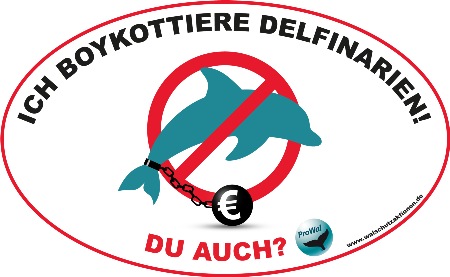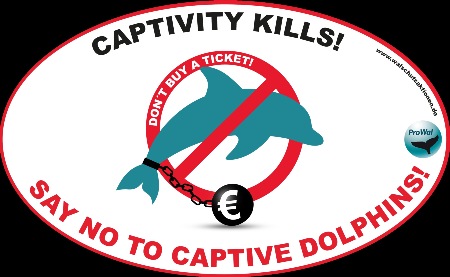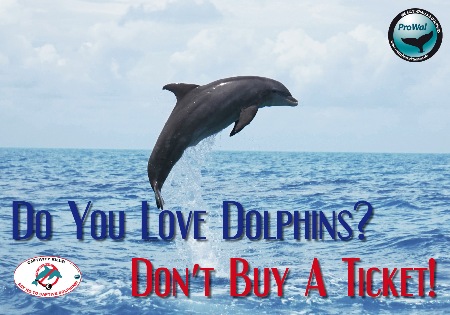

|


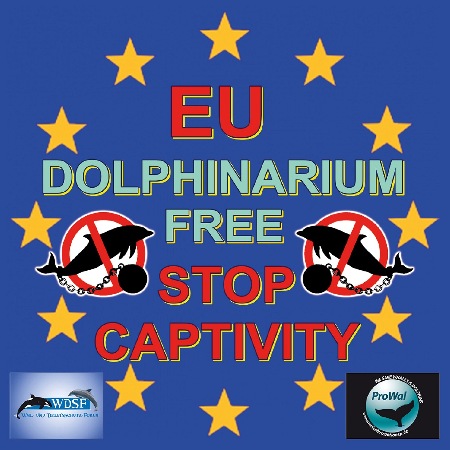
(TEXT IN ENGLISH AND GERMAN)
Demo: Closure of the dolphinarium in EU - Brussels (Belgium)
Demo: Schließung der Delfinarien in der EU – Brüssel (Belgien)
08.06.2016
English translation of ProWal/WDSF Press Release
EU Parliamentarian for the Freedom of Dolphins – WDSF and ProWal Demo in Brussels
To conclude a four-week European
tour, with demonstrations in front of 19 dolphinaria against keeping
dolphins in captivity in zoos and leisure parks, the animal rights
organizations ProWal (Radolfzell), with Andreas Morlok, and the Hagener
Whale and Dolphin Protection Forum (WDSF), protested on Saturday 04 June
2016 in front of the European Parliament in Brussels. The EU Delegate
Stefan Bernhard Eck promised to discuss the issue of the abolition of
dolphinaria for the freedom of dolphins in the European Parliament.
In his speech at the demo on the subject of around 300 dolphins held in
European dolphinaria, Eck stated: “It is time to end this scandal. As
from today the abolition of dolphinaria and freedom for dolphins will a
subject for discussion in the European Parliament. I will do my best to
ensure this."
Stefan B. Eck has been a delegate in the European
Parliament since 2014 and is the founding member of the “MEPs for
Wildlife“ and vice-president of the “Intergroup on the Welfare and
Conservation of Animals”. His major concerns are animal conservation,
animal rights and environmental protection.
The two whale and
dolphin protection organizations demand that the use of seawater in
dolphinaria must be compulsory because processed water, with additives
of ozone and chlorine, can result in serious damage to the sensitive
eyes, skin and respiratory tracts of the marine mammals. Only last year,
the Ukraine passed an Act to this effect.
An application by
„Bündnis90/Die Grünen“ (political party The Greens) submitted to the
German parliament to: “End the Keeping of Dolphins in Captivity” was
voted down by the former government coalition of the CDU/CSU and FDP. An
application by the “Pirates” (political party) in Nordrhein-Westfalen
(Germany) state parliament to “Ban the Keeping of Dolphins”, was
rejected by the government coalition with the Greens and SPD in October
2014.
WDSF director Jürgen Ortmüller: “Since the German
government has a policy of not wanting to stop the captivity of dolphins
in parks and zoos (unlike many other European states), we realize that
only European demand and pressure can end the abuse of dolphins in
captivity. ProWal and WDSF are now happy that the EU-Parliamentarian
Stefan Eck wants to bring the subject to the attention of the competent
bodies. In the end the European Council, and hence also a German Federal
Chancellor, will have to decide whether the cruelty to dolphins in
captivity will continue or not”.
Photo: Jürgen Ortmüller (Whale
and Dolphin Protection Forum - WDSF), Sandra Gabriel (Assistant of
Stefan B. Eck), EU Delegate Stefan B. Eck, Andreas Morlok (ProWal) -
WDSF/ProWal Photo)
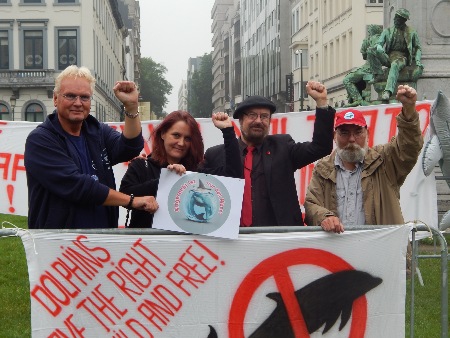
06.06.16 - Pressemitteilung - EU-Parlamentarier für die Freiheit der Delfine - WDSF und ProWal Demo in Brüssel
05.06.16 - Für ein Delfinarium-freies Europa
Am 04.06.2016 sandten Andreas Morlok (ProWal), Jürgen Ortmüller (WDSF) und der EU-Abgeordnete Stefan Bernhard Eck ein deutliches Signal an das Europäische Parlament und an die Betreiber von Delfinarien: Schließung der Gefängnisse der intelligenten Meeressäuger! Europa braucht keine Delfinarien!
Eine aktuelle Forderung der beiden engagierten Wal- und Delfinschützer besteht darin, dass die Verwendung von Meerwasser in Delfinarien verbindlich sein muss, da aufbereitetes Süßwasser mit Zusätzen von Ozon und Chlor zu gravierenden Schädigungen der empfindlichen Augen, Haut und Atemwege der Meeressäuger führt.
MdEP Stefan B. Eck (Gründungsmitglied der "MEPs for Wildlife": www.meps4wildlife.eu, Vizepräsident der "Intergroup on the Welfare and Conservation of Animals") wird sich ab Herbst diesen Jahres des Themas verstärkt annehmen, da der Schutz des Meeres und seiner Bewohner - trotz des gigantischen Tierleids in der „Massentierhaltung“ - nicht zu kurz kommen darf.
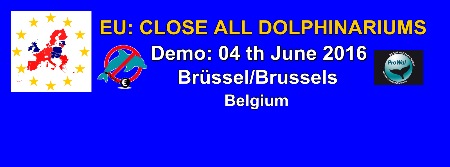
VIDEO – ProWal-Demo-Tour – “EU
– DOLPHINARIUM FREE” - https://www.youtube.com/watch?v=m0YoHnZ3QKA&feature=em-upload_owner
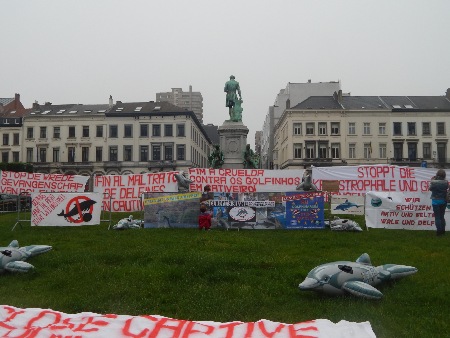
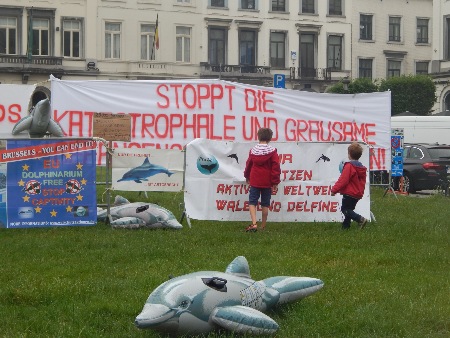
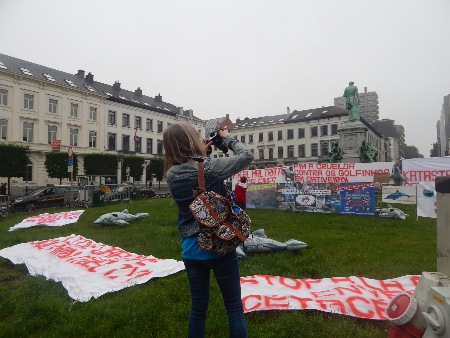
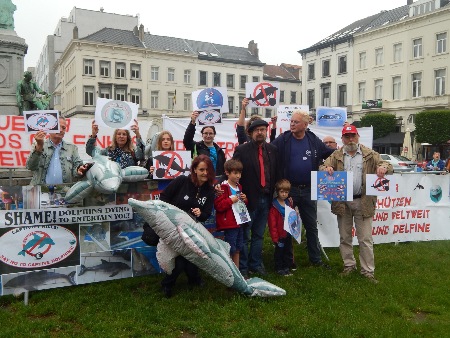
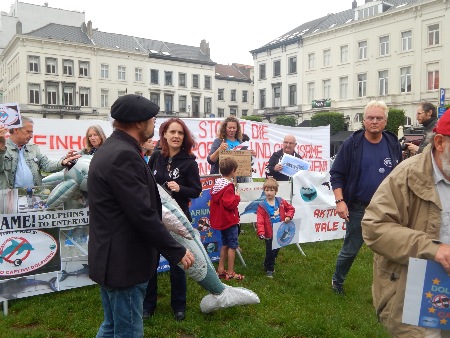
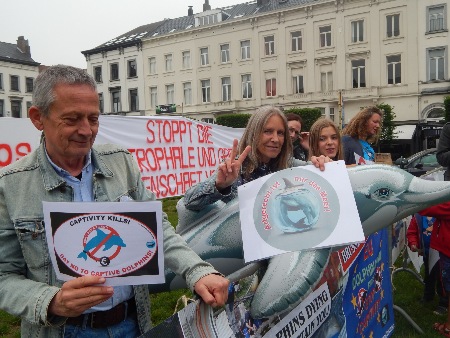
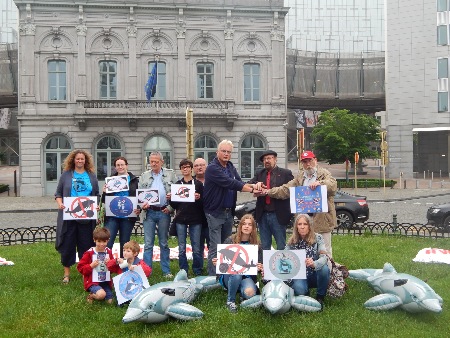
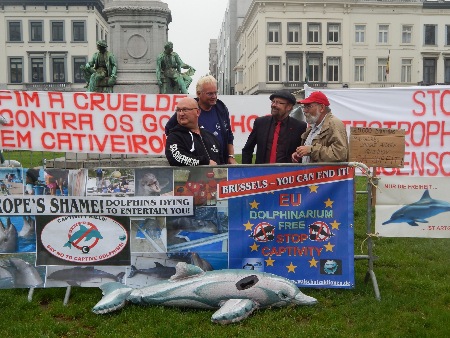
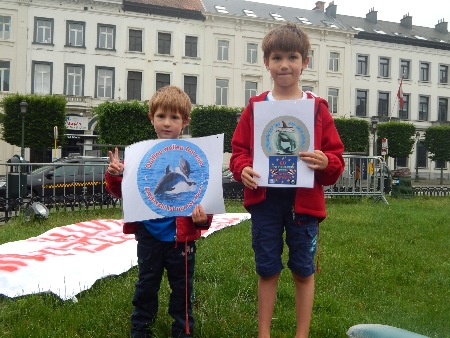
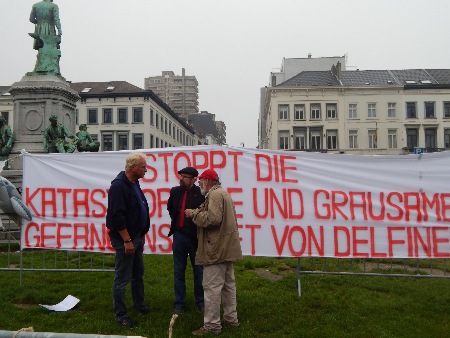
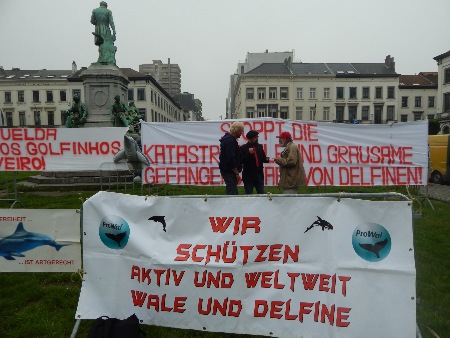
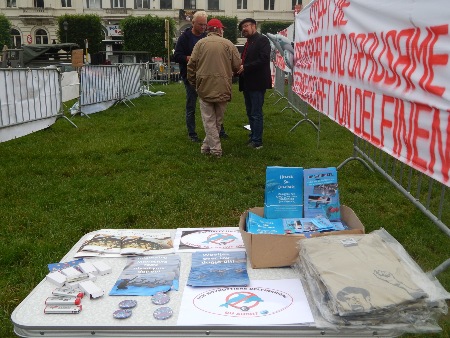
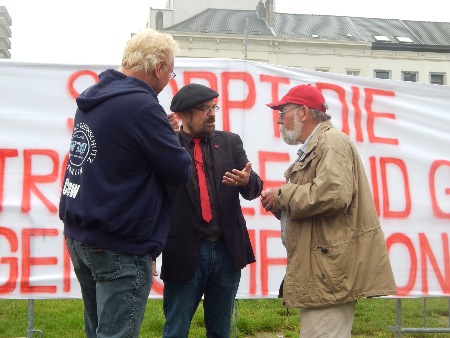
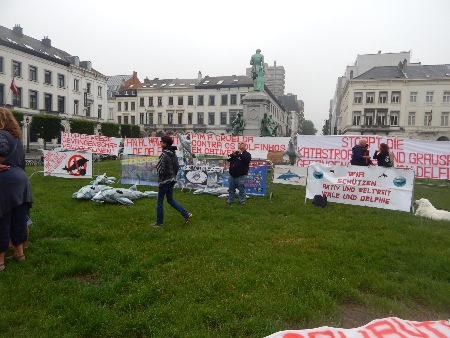

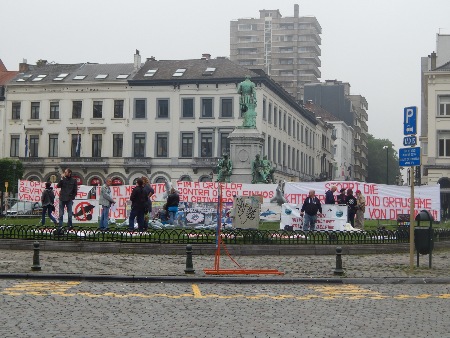
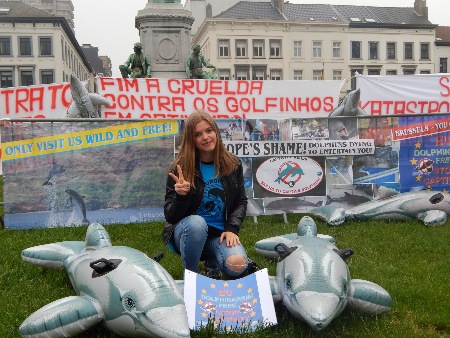
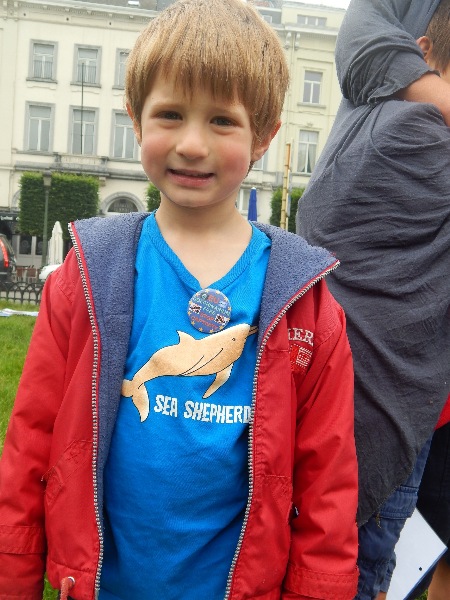
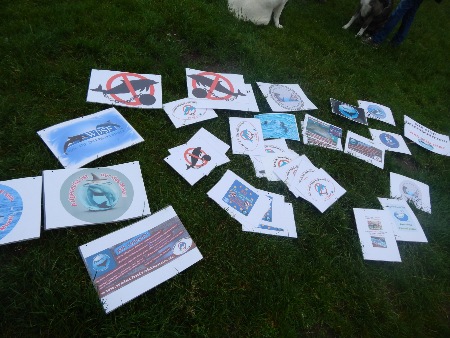
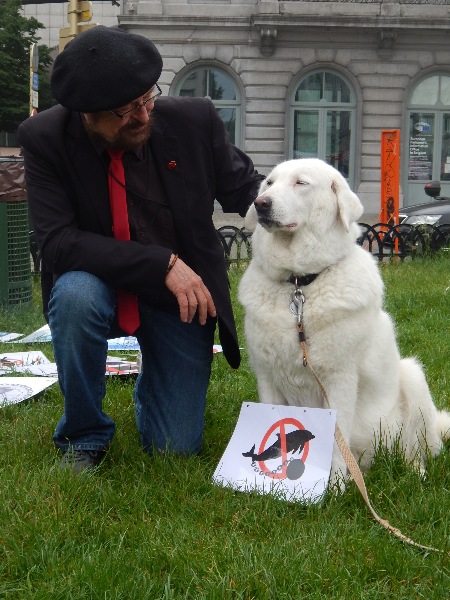
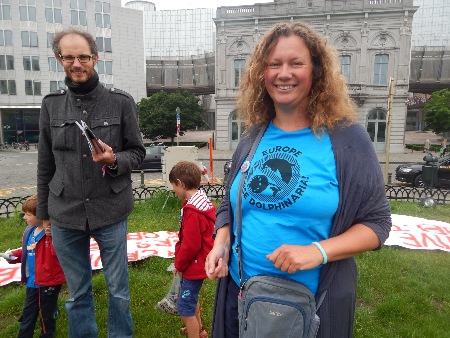
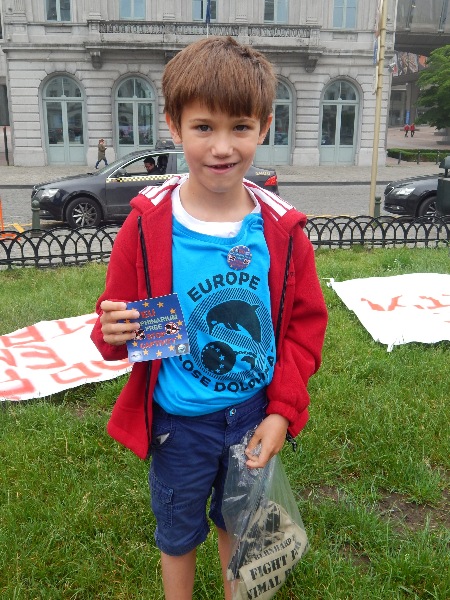
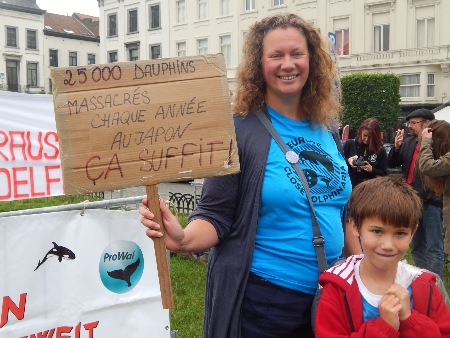
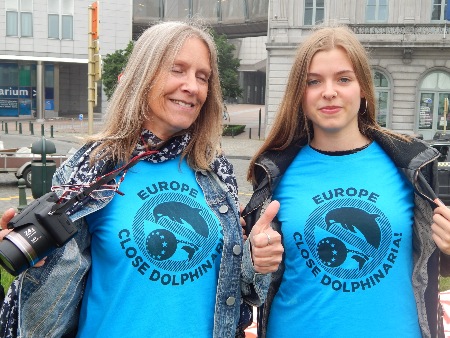
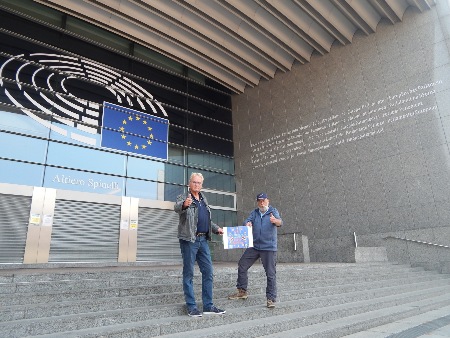
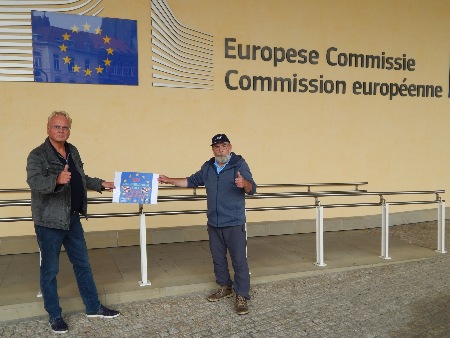
Under the ProWal campaign "EU - DOLPHINARIUM FREE" to close all 30 show dolphinariums in the European Union a public demonstration takes place in Brussels.
We would like to cordially invite you!
Please come and add your voice to stop the dolphin entertainment in the EU!
Please do bring your own posters, banners.
Please join the event and invite your friends!
For the freedom of dolphins and against captivity in concrete prisons!
Andreas Morlok - CEO ProWal
=================
There are currently 30 show dolphinariums in 14 countries of the European Union. Mainly large porpoises, but also orcas (France/Spain), beluga whales (Spain), harbour porpoises (Holland) and an Amazonian river Dolphin (Germany) are kept in these facilities.
-------------------------------
I. DEMAND:
ABOLITION OF THE EEP FOR DOLPHINS
Reasons:
All show dolphinariums merged a few years ago and are organised under the ominous European Endangered Species Programme (EEP) for dolphins. Mainly commercial recreation parks are found in this amalgamation. Zoo members are the exception.
In 2010, the German federal government announced that large porpoises will be listed in a stud book. This stud book includes all animals which are kept in European dolphinariums, as well as outside the EU. The EEP does not disclose which dolphinariums it concerns outside the EU and within Europe. In Europe, there are still dolphinariums in the Ukraine and Russia. Both countries are importers of wild dolphins which have been caught in Taiji, Japan!
The stud book is treated as a state secret by the EEP. Any request for disclosure or inspection is refused. No outsider, not even governments, get a glimpse!
Of course there are reasons for this lack of transparency.
The dolphinariums in the EU are connected to the wild dolphins caught during the cruel and brutal hunts in Japan!
In the past, SeaWorld in the US bought wild dolphins caught in Japan and started its own breeding programme. The Dutch dolphinarium in Harderwijk bought dolphins from SeaWorld/USA. To this day the EEP doesn’t disclose which dolphins it concerns.
In 1979 three dolphins were bought by a German zoo in Japan and imported to Germany. A dolphin died in 1990. The whereabouts of the other three dolphins is unaccounted for to this day. Even the EEP has no information about this.
In 2013 a circus operator in Prague tried to import dolphins from the Ukraine to the Czech Republic. Since there was limited breeding success of dolphins in the Ukraine, these dolphins either originated from illegal catches in the Black Sea or were purchased from Japan. The importing of dolphins of dubious origin into the EU could be hindered by interventions of PETA in Prague and ProWal at the responsible environmental ministry in Kiev.
A ProWal/WDSF survey in 2014 of all dolphinariums in the EU in accordance with DNA analysis data drew no results. On this occasion all the dolphinariums refused to collaborate or allow the inspection of already available data, which of course provided deep insight!
An impenetrable dolphin carousel exists in the EU!
Dolphins are continually torn from their social structure and passed to and fro between the dolphinariums in the EU for breeding purposes. For instance, the dolphin Anke had already been transferred for the sixth time in her life between countries. After another still birth, Anke was brought from Holland to the German zoo in Nuremberg, to try for offspring there. It took several hours to catch Anke. In the process dolphins injure their fins, tails, flippers and behind the blow hole. The dolphins are sedated with the psychotropic Diazepam. This type of information is only obtainable when the individual documents are inspected. However, most EEP members do not allow this. There are no special regulators who control the EEP.
After nearly 50 years of breeding attempts there are only a few dolphins in the EU which have been born in the 2nd generation and still live.
Surplus male dolphins, who are no longer needed for breeding, are likewise victims. They are kept in groups, in which there are no female dolphins, for instance in dolphinariums in Malaga. It is the purest form of animal cruelty to prevent dolphins from living out their natural sexual lives! In many dolphinariums it is also the norm to give female dolphins contraceptive medication. However, sustained dosage poses a health risk. Tumours caused through this were noticed in other animal species.
The dolphins should not be kept in captivity in this way, so that they are able to live out their natural and biological behaviour.
The reasons given by the dolphinarium industry about animal protection, breeding, development and research are pure alibis. Dolphinariums are still run today in the EU for purely commercial reasons.
The EEP does not contribute to the protection of species. Not a single dolphin was returned to the wild from the dolphinariums in the EU.
The EEP has no right to exist and must be abolished!
II. DEMAND:
OBLIGATION TO USE SEA WATER IN DOLPHINARIUMS!
Reasons:
After intervention by animal rights activists the Ukraine was the first country in the world to pass a law in 2015 which prescribes the use of sea water in dolphinariums.
At this point we would like to thank the Parliament of the Ukraine (Rada) again for the passing of the bill and President Petro Poroschenko for his signature to the law!
The precise wording from this law of the Vidomosti Verkhovnoi Rady Ukrainy (VVR):
“The law “To protect animals from animal cruelty” was changed on 9th April 2015. The running of dolphinariums without natural sea water is forbidden.”
This passage is a significant measure, which is aimed at the protection of dolphins from animal cruelty. It sets an example for the EU and for other countries in which marine mammals are kept in captivity!
What’s wrong with enriching water in dolphinariums with chlorine or ozone?
In order to underpin the regulation that dolphinariums must use sea water, Ukrainian animal rights activists use these arguments among others (translated from Ukrainian):
The chlorination of water, in which dolphins are kept, can have the following effect:
- Dolphins' eyes and skin irritation. Prolonged exposure to chlorinated water may result in negative health effects. Over time dolphin's skin becomes gradually discoloured; it ruptures and develops large white spots. Chlorinated water also causes diseases in seals and sea lions. Skin infections contracted by sea mammals, in chlorinated water, can be the result of ruined beneficial microflora and inactivation of antimicrobial agents excreted by the skin (Geraci, St. Aubin, and Hicks). Dolphins suffer from eye problems involving a thin protective layer that covers the cornea; some dolphins start secreting large amounts of mucus around their eyes as a defence mechanism. Excessive use of chlorine can cause eye burns. Dyeing the pool in blue colour leads to its excessive illumination and, along with exposing the eyes to direct sun light when performing tricks, causes cataracts and corneal diseases.
- Use of chlorine creates problems similar to those caused by carcinogenic substances. The effect of chlorine and its by-products is unfit for sea mammals. Departure from the natural habitat conditions begins with changing the pH level from that of the sea to that of a man-made pool. Majority of facilities keeping sea mammals maintain the pH level of 7.6 to 7.8, whereas a much higher than 8.3 pH level is typical of the ocean (studies by Jason Dombrosky (West Edmonton Mall - Dolphin Lagoon, Edmonton, Alberta, Canada)).
- Chlorination of water prevents dolphins from using certain types of communication. Dolphins release signalling agents, or pheromones, needed for their social and sexual behaviour into the water. These agents are destroyed by chlorine (research studies by Herman and Tavolga).
- Respiratory diseases. Dolphins were observed to develop inflammation around the spiracle, airways and bronchial inflammation. Chlorine gas in concentrations of 10 parts per million causes significant irritation of airways, while even 1 part can be lethal if breathed for 5 minutes (Goodman and Gilman).
- Combined with chlorine, animal faeces form substances irritating their skin and eyes.
Ozone is potentially toxic and can cause irritation to eyes, skin, and the respiratory system; therefore, it should be used with utmost care to avoid the risk to staff and animals. Ozone, being an effective bactericidal agent and a powerful oxidant, is unstable in water. It also acts as a discolouring agent by attacking carbon double bonds and removing colour pigments (Toorn 1987). Ozone is more effective than chlorine against faecal bacteria Escherichia coli, plankton, insects, and, possibly, viruses. However, the effectiveness of ozone decreases in water with a high density of microorganisms or higher suspended materials concentration. Unlike chlorine, ozone does not leave residual disinfectants in the water environment if the oxidation potential in the feed point is maintained at a level lower than 600 millivolts (Reidarson 2003). Higher concentrations of ozone can also cause damage to cornea, skin, and airways (the same reference).
____________________________
The ProWal campaign “EU – DOLPHINARIUM FREE” demands that the EU also passes such a law which applies to all member states!
A dolphinarium which does not fulfil nor implement this criteria must be closed.
It is foreseeable that some inland dolphinariums will not be able implement this criteria for logistical and financial reasons and will have to hand over their dolphins to other dolphinariums. There is a massive excess of dolphins, which have to be accommodated in a manner appropriate to the species.
All dolphinariums in the EU have reached a dead end and created a problem for which they must take responsibility!
The European dolphin industry never intended to return dolphins to the wild or accommodate them in a manner suitable for the species. All dolphins, whether wild or offspring, are supposed to die in dolphinariums at the end of their show life and the profits made from this animal exploitation flows into their own pockets.
This must end!
Therefore, all the dolphinariums in the EU must be obliged to finance and implement a project, in which dolphins can be kept in one or several bays supervised by people.
__________________
For more information about the campaign visit:
https://www.facebook.com/groups/1455106121449574/
or on the ProWal website at:
http://walschutzaktionen.de/2881311/home.html
==================
Organizer:
ProWal
Projekt Walschutzaktionen (ProWal) gemeinnützige UG (haftungsbeschränkt)
Meeressäuger-Umweltschutzgesellschaft
Nonprofit marine mammal environmental protection society
GUG (limited)
Post-Anschrift:
ProWal
Haydnstraße 1
D-78315 Radolfzell
Kommunikation:
Tel: 0049 (0)7732 14324
Mobil: 0173 43 585 96
E-Mail: ProWal-Deutschland@t-online.de
Webseite:
www.walschutzaktionen.de
Facebook:
https://www.facebook.com/pages/ProWal/120565088001151
=============================

Demo: Schließung der Delfinarien in der EU – Brüssel (Belgien)
Ort:
EU-Parlament
Brüssel
Belgien
Datum: 04.06.2016
Demo-Time: 11:00 - 14:00
Im Rahmen der ProWal-Kampagne „EU – DOLPHINARIUM FREE“ zur Schließung aller 30 Show-Delfinarien in der Europäischen Union findet in Brüssel eine öffentliche Demonstration als Abschlusskundgebung statt!
Dazu möchten wir Euch recht herzlich einladen!
Nimm Dir die Zeit und erhebe Deine Stimme zur Beendigung der Delfinhaltung in Europa!
Gerne können eigene Plakate, Transparente und alles Passende zum Thema mitgebracht werden.
Für die Freiheit der Delfine und gegen die Gefangenschaft in Betongefängnissen!
Andreas Morlok - CEO ProWal
VIDEO – ProWal-Demo-Tour – “EU
– DOLPHINARIUM FREE” - https://www.youtube.com/watch?v=m0YoHnZ3QKA&feature=em-upload_owner
---------------------------------
In der Europäischen Union (EU) befinden sich derzeit in 14 Ländern 30 Show-Delfinarien. Überwiegend werden in diesen Anlagen Große Tümmler, aber auch Orcas (Frankreich/Spanien), Beluga-Wale (Spanien), Hafenschweinswale (Holland) und ein Amazonas Fluss-Delfin (Deutschland) in Gefangenschaft gehalten.
I. FORDERUNG:
ABSCHAFFUNG DES EEP FÜR DELFINE
Begründungen:
Alle Show-Delfinarien haben sich vor einigen Jahren zusammengeschlossen und sind in dem ominösen Europäischen Erhaltungszuchtprogramm (EEP) für Delfine organisiert. In diesem Zusammenschluss befinden sich überwiegend kommerzielle Freizeitparks - Zoo-Mitglieder sind dabei die Ausnahmen.
Wie die deutsche Bundesregierung in 2010 bekannt gab, werden die Großen Tümmler in einem Zuchtbuch aufgeführt. Dieses Zuchtbuch erfasst alle Tiere, die in europäischen Delfinarien, also auch außerhalb der EU, gehalten werden. Um welche Delfinarien es sich außerhalb der EU und innerhalb Europas handelt, wird vom EEP verschwiegen. In Europa gibt es nur noch Delfinarien in der Ukraine und in Russland. Beide Länder sind Importeure von wildgefangenen Delfinen aus Taiji/Japan!
Das Zuchtbuch wird vom EEP wie ein Staatsgeheimnis behandelt. Jegliche Forderung nach Offenlegung oder Einsichtnahme wird verweigert. Kein Außenstehender, nicht einmal Regierungen, erhalten darin einen Einblick!
Diese Intransparenz hat wohl Gründe!
Es gibt Verbindungen der Delfinarien in der EU zu wildgefangenen Delfinen aus den grausamen und brutalen Treibjagden in Japan!
SeaWorld in den USA kaufte in der Vergangenheit wildgefangene Delfine in Japan und startete ein eigenes Zuchtprogramm. Das holländische Delfinarium in Harderwijk kaufte Delfine von SeaWorld/USA. Bis heute verschweigt das EEP um welche Delfine es sich dabei handelte!
1979 wurden von einem deutschen Zoo drei Delfine in Japan gekauft und nach Deutschland importiert. Ein Delfin starb 1990. Der Verbleib der anderen beiden Delfine ist bis heute ungeklärt! Auch darüber gibt das EEP keine Auskunft!
In 2013 gab es einen Versuch von einem Zirkusbetreiber in Prag, Delfine aus der Ukraine nach Tschechien zu importieren. Da es kaum Zuchterfolge von Delfinen in der Ukraine gab, stammten diese Delfine entweder von illegalen Fängen aus dem Schwarzen Meer oder waren Käufe aus Japan. Durch Interventionen von PETA in Prag und ProWal beim zuständigen Umweltministerium in Kiew konnte dieser Import von Delfinen mit dubioser Herkunft in die EU verhindert werden!
Eine ProWal/WDSF-Anfrage in 2014 bei allen Delfinarien in der EU nach DNA-Analyse-Daten blieb ergebnislos. Alle Delfinarien verweigerten hierbei eine Zusammenarbeit oder die Einsichtnahme in schon vorhandenen Daten, was natürlich tief blicken lässt!
In der EU besteht ein undurchschaubares Delfin-Karussell!
Für Zuchtzwecke werden Delfine ständig aus ihrem Sozialgefüge gerissen und quer durch die EU zwischen den Delfinarien hin- und hergeschoben. Beispielsweise wurde der Delfin Anke schon zum sechsten Mal in seinem Leben zwischen Ländern transferiert. Nach einer weiteren Totgeburt wurde Anke von Holland in den deutschen Zoo nach Nürnberg gebracht, um dort für Nachwuchs zu sorgen. Mehrere Stunden dauerte die Fangaktion von Anke. Dabei verletzte sich der Delfin an Finne, Fluke, Flipper und hinter dem Blasloch. Ruhiggestellt wurde der Delfine mit dem Psychopharmakon Diazepam. Solche Informationen sind nur erhältlich, wenn es Einsichten in die eigenen Unterlagen gibt, die jedoch von den meisten EEP-Mitgliedern verweigert werden. Es gibt keine spezielle Aufsichtsbehörde, die das EEP kontrolliert.
Nach fast 50 Jahren Zuchtbemühungen gibt es nur wenige Delfine in der EU, die in 2. Generation geboren sind und noch leben.
Überschüssige männliche Delfine, die zur Zucht nicht mehr gebraucht werden, sind ebenfalls die Leidtragenden. Sie werden in Gruppen gehalten, in denen es überhaupt keine weiblichen Delfine gibt, wie zum Beispiel im Delfinarium in Malaga. Es ist reine Tierquälerei, wenn Delfine an ihrem Ausleben ihres natürlichen Sexuallebens gehindert werden! In vielen Delfinarien ist es üblich, dass den weiblichen Delfinen auch empfängnisverhütende Medikamente verabreicht werden. Eine Dauerverabreichung stellt jedoch ein gesundheitliches Risiko dar. Bei anderen Tierarten wurden dadurch verursachte Tumore festgestellt!
Die Delfine können in Gefangenschaft nicht so gehalten werden, damit sie ihre natürlichen und biologischen Verhaltensweisen ausleben können.
Die vorgeschobenen Gründe der Delfinarien-Industrie für den Artenschutz, die Zucht, der Bildung und der Forschung sind reine Alibis! Der einzige Grund, warum heute in der EU überhaupt noch Delfinarien betrieben werden, sind überwiegend kommerzielle Interessen!
Zum Artenschutz trägt das EEP nicht bei. Kein einziger Delfin wurde von den Delfinarien in der EU wieder ausgewildert.
Das EEP für Delfine hat keine Daseinsberechtigung und muss abgeschafft werden!
------------------------------------------------------
II. FORDERUNG:
PFLICHT ZUR NUTZUNG VON MEERWASSER IN DEN DELFINARIEN!
Begründungen:
Nach Interventionen von Tierschützern hat die Ukraine als erstes Land der Welt 2015 ein Gesetz verabschiedet, welches die Nutzung von Meerwasser in den Delfinarien vorschreibt!
An dieser Stelle danken wir erneut dem Parlament der Ukraine (Rada) für die Verabschiedung und dem Präsidenten Petro Poroschenko für seine Unterzeichnung des Gesetzes!
Der genaue Wortlaut:
Vidomosti Verkhovnoi Rady Ukrainy (VVR)
„Das Gesetz „Zum Schutz von Tieren vor Tierquälerei“ wurde am 9. April 2015 geändert. Das Betreiben von Delfinarien ohne natürliches Meerwasser ist verboten.“
Dieser Passus ist eine signifikante Maßnahme, die auf den Schutz der Delfine vor Tierquälerei ausgerichtet ist! Er hat Vorbild-Charakter für die EU und auch für andere Länder, in denen Meeressäugetiere in Gefangenschaft gehalten werden!
Was spricht gegen die Anreicherung des Wassers mit Chlor oder Ozon in den Delfinarien?
Um die Vorschrift, dass Delfinarien Meerwasser benutzen müssen, zu untermauern, verwendeten die ukrainischen Tierschützer unter anderem diese Argumente (Übersetzt aus der ukrainischen Sprache):
Die Chlorierung von Wasser, in dem Delfine gehalten werden, kann sich wie folgt auswirken:
Reizung der Augen und Haut der Delfine. Längerer Kontakt mit chlorhaltigem Wasser kann negative Auswirkungen auf die Gesundheit haben. Mit der Zeit verfärbt sich die Haut des Delfins; sie platzt und entwickelt große weiße Flecken. Hautinfektionen, die sich Meeressäuger in chloriertem Wasser zuziehen, können das Ergebnis zerstörter gesunder Mikroflora und Inaktivierung von antimikrobiellen Wirkstoffen, die von der Haut abgeschieden werden, sein (Geraci, St. Aubin und Hicks).
Delfine leiden an Augenproblemen unter Beteiligung einer dünnen Schutzschicht, die die Hornhaut bedeckt; einige Delfine beginnen, als Verteidigungsmechanismus, große Mengen Schleim rund um ihre Augen abzuscheiden. Übermäßige Verwendung von Chlor kann Augenverätzungen verursachen. Blaufärbung des Pools führt zu seiner übermäßigen Beleuchtung und verursacht zusammen mit der Exposition der Augen zu direkter Sonnenbestrahlung bei Vorführung von Tricks Katarakte und Hornhauterkrankungen.
Die Verwendung von Chlor schafft ähnliche Probleme wie die durch karzinogene Stoffe verursachten Probleme. Die Wirkung von Chlor und seiner Nebenprodukte ist für Meeressäuger untauglich. Abweichungen von den natürlichen Lebensraumbedingungen beginnen mit der Änderung des pH-Werts gegenüber dem des Meeres zu dem in einem von Menschenhand geschaffenen Pools. Die Mehrzahl der Einrichtungen, die Meeressäuger halten, halten den pH-Wert auf 7,6 bis 7,8, während ein weitaus höherer ph-Wert typisch für den Ozean ist (Untersuchungen von Jason Dombrosky (West Edmonton Mall - Dolphin Lagoon, Edmonton, Alberta, Kanada)).
Chlorierung des Wassers verhindert, dass Delfine bestimmte Arten von Kommunikation nutzen können. Delfine setzen Botenstoffe bzw. Pheromone, die für ihr soziales und sexuelles Verhalten benötigt werden, im Wasser frei. Diese Stoffe werden durch Chlor zerstört (Forschungsstudien von Herman und Tavolga).
Atemwegserkrankungen. Es wurde beobachtet, dass Define Entzündungen rund um das Atemloch, die Atemwege und bronchiale Entzündungen entwickeln. Chlorgas in Konzentrationen von 10 Teilen pro Million verursacht signifikante Reizung von Atemwegen, während selbst 1 Teil tödlich sein kann, wenn er 5 Minuten lang eingeatmet wird (Goodman und Gilman).
Kombiniert mit Chlor bilden tierische Fäkalien Stoffe, welche ihre Haut und Augen reizen.
Ozon ist potenziell toxisch und kann Reizungen an Augen, Haut und an den Atemwegen verursachen. Daher sollte es mit äußerster Sorgfalt verwendet werden, um Gefahren für Angestellte und Tiere zu vermeiden. Ozon, das ein wirksames keimtötendes Mittel und ein leistungsfähiges Oxidationsmittel ist, ist in Wasser instabil. Es wirkt ebenfalls als Entfärbungsmittel, indem es die Doppelbindungen von Kohlenstoff angreift und Farbpigmente entfernt (Toorn 1987).
Ozon ist wirksamer als Chlor gegen fäkale Bakterien, Escherichia coli, Plankton, Insekten und möglicherweise Viren. Die Wirksamkeit von Ozon verringert sich jedoch im Wasser mit hoher Dichte an Mikroorganismen oder höherer Konzentration an Schwebstoffen. Anders als Chlor hinterlässt Ozon keine Desinfektionsmittelreste im Wasser, wenn das Oxidationspotenzial in der Einspeisestelle auf einem Wert unter 600 Millivolt gehalten wird (Reidarson 2003). Höhere Konzentrationen von Ozon können ebenfalls Schäden an Hornhaut, Haut und Atemwegen verursachen (die gleiche Referenz).
Mit der ProWal-Kampagne "EU - DOLPHINARIUM FREE" soll die EU aufgefordert werden, ebenfalls ein solches Gesetz zu beschließen, welches für alle Mitgliedstaaten gelten muss!
Ein Delfinarium, welches dieses Kriterium nicht erfüllen und umsetzen kann, muss geschlossen werden.
Es ist absehbar, dass viele Inlands-Delfinarien dieses aus logistischen und finanziellen Gründen nicht umsetzen können und ihre Delfine an andere Delfinarien abgeben müssten. Es gäbe einen massiven Überschuss an Delfinen, die artgerechter untergebracht werden müssten.
Alle Delfinarien in der EU haben sich selbst in eine Sackgasse manövriert und ein Problem geschaffen, für welches sie zur Verantwortung gezogen werden müssen!
Es war von der europäischen Delfinarien-Industrie nie beabsichtigt, Delfine wieder auszuwildern oder sie artgerechter, zum Beispiel in einer von Menschen betreuten Meeresbucht, unterzubringen. Alle Delfine, ob Wildfänge oder Nachzuchten, sollen am Ende ihres Show-Lebens in den Delfinarien sterben und die erzielten Gewinne aus dieser Tierausbeutung in die eigenen Taschen fließen.
Damit muss nun Schluss sein!
Alle Delfinarien in der EU müssen daher dazu verpflichtet werden, ein Projekt zu finanzieren und umzusetzen, in dem Delfine in einer oder mehreren von Menschen betreuten Meeresbuchten untergebracht werden können!
---------------------------------
Weitere Informationen zur Kampagne unter:
https://www.facebook.com/groups/1455106121449574/
oder auf der ProWal-Webseite unter:
http://walschutzaktionen.de/2881311/home.html
==================
Veranstalter:
ProWal - Weil sie uns brauchen!
Projekt Walschutzaktionen (ProWal) gemeinnützige UG (haftungsbeschränkt)
Meeressäuger-Umweltschutzgesellschaft
Post-Anschrift:
ProWal
Haydnstraße 1
D-78315 Radolfzell
Kommunikation:
Tel: 0049 (0)7732 14324
Mobil: 0173 43 585 96
E-Mail: ProWal-Deutschland@t-online.de
Webseite:
www.walschutzaktionen.de
Facebook:
https://www.facebook.com/pages/ProWal/120565088001151
==============
PRESSE-MITTEILUNG -
ProWal - 04.05.2016
Tierschützer kontra
Delfinarien – EU-Parlament soll helfen
Mit
einer Demonstrationstour durch sieben europäische Länder vor 19 Delfinarien
wollen Tierschützer der deutschen Tierschutzorganisation ProWal jetzt auf das
Leid von Delfinen in den 30 Show-Delfinarien in der EU aufmerksam machen und
diese letztendlich schließen. Sie setzen dabei auch auf die Unterstützung des
EU-Parlamentes in Brüssel.
Die
vierwöchige Demonstrationstour startet am 7. Mai in Deutschland und führt über
Italien, Frankreich, Spanien, Portugal und Holland bis nach Belgien. Sie endet
am 4. Juni mit einer Abschluss-Kundgebung vor dem Europäischen Parlament in
Brüssel.
ProWal
bemängelt nicht nur, dass den Meeressäugetieren in den Delfinarien viel zu
wenig Platz zur Verfügung steht, sie dort ihre natürlichen Bedürfnisse nicht
ausleben können, die Tiere durch den toten Fisch, den sie zum Fressen bekommen
oftmals ihren eigenen Flüssigkeitshaushalt nicht ausgleichen können, sondern
auch, dass die Tiere in einem Wasser leben müssen, welches chemisch mit Chlor
oder Ozon aufbereitet wird.
Andreas
Morlok, Geschäftsführer von ProWal: „In dieser Chemiebrühe können nicht einmal
Fische überleben! Obwohl schwerwiegende gesundheitliche Risiken wie
Dehydratation, Augen-, Haut- und Lungenprobleme längst bekannt sind, ist der
Einsatz von Chlor und Ozon für die Wasseraufbereitung in fast allen Delfinarien
gängige Praxis! Das muss nun endlich europaweit gesetzlich verboten werden!“
Nach
Angaben von ProWal führten Interventionen von Tierschützern letztes Jahr dazu,
dass die Regierung der Ukraine als erstes Land der Welt ein Gesetz beschlossen
hat, welches die Nutzung von Meerwasser in den Delfinarien vorschreibt! Ein
Neubau eines Delfinariums erhielt keine Betriebsgenehmigung, weil es diese
Auflage nicht erfüllen konnte.
Jürgen
Ortmüller, Geschäftsführer des deutschen Wal- und Delfinschutz-Forum (WDSF),
welcher die Kampagne von ProWal unterstützt, sieht die Delfinarien ohnehin im
Zugzwang: „Eine Anlage, die eine Gesetzesvorgabe für die Meerwassernutzung
nicht umsetzen kann, soll sich an der Errichtung einer betreuten Meeresbucht
beteiligen, in dem die Tiere verhaltensgerechter untergebracht werden können.
Die Errichtung eines solchen Sanctuary scheint ohnehin unumgänglich zu sein,
denn nach den Schließungen von etwa 50 Delfinarien in West-Europa ist es
mittlerweile eng in den verbliebenen Delfinarien geworden. Obwohl das
Delfinarium in Finnland seine Schließung auf dieses Frühjahr angekündigt hatte,
finden die Betreiber ganz offensichtlich keinen geeigneten Platz mehr für eine
geeignete Unterbringung ihrer vier Delfine. Die geplante Schließung wurde
deshalb auf den Herbst verschoben.“
ProWal
und WDSF wollen dem Europäischen Parlament nicht nur die Schadhaftigkeit des
Chemiewassers für die Delfine belegen, sondern auch, dass die immer wieder
vorgetragenen Argumente seitens der Delfinarien-Industrie Bildung, Wissenschaft
und Arterhaltung, um den Betrieb ihrer Anlagen überhaupt noch rechtfertigen zu
können, eine Farce und ein Deckmantel sind, um kommerzielle Interessen zu
verbergen.
Andreas
Morlok: „Die Besucher lernen in der künstlich geschaffenen Welt der Delfinarien
nichts über die Natürlichkeit von Delfinen. Sie erfahren auch nie etwas
darüber, dass schon mehrmals wildgefangene Delfine aus Japan nach Europa
gelangten, obwohl alle Delfinarien diese brutalen und blutigen Treibjagden
offiziell ablehnen. Die wissenschaftlichen Ergebnisse, die in Delfinarien
erzielt werden, sind auf freilebende Populationen nicht übertragbar und damit
wertlos. Mit Arterhaltung haben diese Anlagen in der EU ohnehin nichts zu tun,
denn noch nie wurde von ihnen ein in Gefangenschaft gehaltener Delfin
ausgewildert.
In
Wahrheit stecken hinter jedem Delfinarium rein finanzielle Interessen. Obwohl
es kaum noch Platz für weitere Tiere in den europäischen Delfinarien gibt, wird
weiterhin an der Zucht festgehalten, denn der Handel mit Delfinen ist immer
noch äußerst lukrativ. Wir werden dem Europäischen Parlament auch belegen, dass
ein Delfin, der in Italien geboren wurde, für 366.000 € an ein anderes
Delfinarium abgegeben wurde!
Wir
sind sehr zuversichtlich, dass das Europäische Parlament ein Gesetz beschließen
wird, um die miserablen Haltungsbedingungen für die Delfine zu beenden. Die
ersten Parlamentarier haben bereits ihre Unterstützung zugesagt.“
-----------------
-----------------
Animal rights
activists against dolphinaria – the EU Parliament should help
Animal rights
activists from the German animal welfare organisation ProWal now want to draw
attention to the suffering of dolphins in the 30 show dolphinaria in the EU by
arranging a tour of seven European countries to demonstrate outside 19 of them,
the ultimate aim being to have them closed down. In doing so they are also
relying on the support of the EU Parliament in Brussels.
The four-week
demonstration tour will start on 7th of May in Germany and will pass
through Italy, France, Spain, Portugal and the Netherlands to finish in
Belgium. It will end on 4 June with a final demonstration outside the European
Parliament in Brussels.
ProWal is
complaining not only that the marine mammals are given far too little space in
the dolphinaria, that they are unable to satisfy their natural requirements in
them and that in many cases the animals are unable to maintain their own fluid
balance with the dead fish they are given to eat, but also that the animals are
forced to live in water which is treated chemically with chlorine or
ozone.
Andreas Morlok, managing
director of ProWal: “Not even fish can survive in this chemical soup! Although
serious risks to health, such as dehydration, eye, skin and lung problems have
long been known, the use of chlorine and ozone for water treatment is current
practice in almost all dolphinaria! This must now be prohibited by law for good
throughout Europe!“
According to ProWal
interventions by animal rights activists last year resulted in the government
of Ukraine being the first country in the world to pass a law prescribing the
use of seawater in dolphinaria! No operating licence was issued to build a new
dolphinarium because it could not comply with this law.
Jürgen Ortmüller, managing
director of the German Whale and Dolphin Conservation Forum (WDSF), which
supports ProWal’s campaign, considers that the dolphinaria are under pressure
anyway: “A facility which is unable to implement a legal prescription for the
use of seawater should contribute to the creation of a sheltered bay in which
the animals can be accommodated in a more behaviourally correct manner. The
creation of such a sanctuary seems inevitable in any case because after the
closure of approximately 50 dolphinaria in Western Europe conditions in the
remaining dolphinaria have now become cramped. Although the dolphinarium in Finland announced its closure for
this spring, the operators are quite obviously unable to find more space for
the suitable accommodation of its four dolphins. The planned closure has
therefore been postponed until the autumn”.
ProWal and WDSF not
only wish to demonstrate to the European Parliament the harmfulness of the
chemical water to the dolphins but also the fact that the arguments that are
repeatedly put forward by the dolphinarium industry relating to education,
science and survival of the species in order to justify the operation of their
facilities are a farce and a cover used to conceal commercial interests.
Andreas Morlok: “The
visitors learn nothing about the natural behaviour of the dolphins in the
artificially created world of the dolphinaria, nor are they ever informed that
dolphins which have already been caught in the wild several times came to
Europe from Japan, although all the dolphinaria officially deny these brutal,
bloody dolphin hunts. The scientific results which are obtained in dolphinaria
cannot be transferred to the wild animals and are therefore worthless. In any
case these facilities in the EU have nothing to do with survival of the species
because no dolphin within the EU kept in captivity has ever been released back
into the wild.
In truth what lie
behind every dolphinarium are purely financial interests. Even though there is
hardly any space for more animals in the European dolphinaria, breeding
continues because trading in dolphins is still extremely lucrative. We will
also be providingthe European Parliament with evidence that a dolphin which was
born in Italy was delivered to another dolphinarium for 366,000 €!
We are very
confident that the European Parliament will pass a law to end the miserable
conditions in which the dolphins are kept. The first parliamentarians have
already promised their support”.

Aus
Tierschutzgründen - Wenn keine Recherche-Arbeit betrieben wird, um
mit der Zielsetzung ein Delfinarium zu schließen, dann machen Sie
bitte einen großen Bogen um solche Tiergefängnisse!
